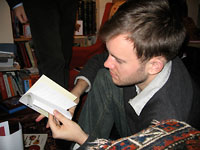Young Modern(ist)

In this issue of Fine Books, we talk to Boris Jardine, 27, the 2008-2009 winner of the Rose Book-Collecting Prize at the University of Cambridge, where he is a Ph.D. student. Jardine’s award-winning collection is called Modernism in print.
FB: You’re in school, what are you studying and how much more schooling is in your future?
BJ: I'm studying for a Ph.D. in history and philosophy of science, at the University of Cambridge. My work focuses on the relationship between science and modernism, specifically surrealism and anthropology in the 1930s. I’m in my final (3rd) year.
FB: Do you work besides going to school?
BJ: I run a small bookshop called Octavo Books. We’re on Abebooks.com.
FB: Tell us about your collection.
BJ: My collection is a working one, and is closely linked to my research -- I collect books to do with socialism and Marxism in the 1930s; poetry from that period; and anything to do with Mass-Observation, the surrealist anthropological movement founded in 1937 that is at the heart of my Ph.D.
FB: How many volumes are in your collection right now?
BJ: Currently, I have about 1000 books.
FB: What was your most recent acquisition for your collection?
BJ: I stumbled upon three boxes of modernist poetry in Bonham’s auction house, Oxford. I hadn’t time to examine them properly before I bought them, and the boxes contain about 300 volumes—mainly small-press pamphlets and obscure journals—so I’m only now discovering the many curiosities therein.
FB: What was your largest purchase for your collection?
BJ: Another auction purchase was my most extravagant: it’s a postcard from the poet Hart Crane to his friend Samuel Loveman, written from Paris in 1929.
FB: What was the best bargain?
BJ: I recently bought the anthropologist Raymond Firth’s copy of Ideology and Utopia by Karl Mannheim, published in English translation in 1936. The description merely said ‘previous owner’s inscription’ and I was delighted to find it was owned by Firth, who is an important figure in my historical research.
FB: What is your favorite book?
BJ: May the Twelfth (1937), which is the first major publication by Mass-Observation. I have a proof copy, which must be extremely rare. The book itself is a bizarre collection of reports from ordinary people on their activities on the day of the coronation of King George VI, May 12 1937.
FB: Who is your favorite bookseller?
BJ: G. David’s bookshop in Cambridge. They have a wonderful rare books room in the back of the shop, and all sorts of academic rarities turn up there.
FB: What would you consider the Holy Grail for your collection?
BJ: I recently read on someone’s blog that they had bought the anthropologist Margaret Mead’s copy of May the Twelfth, and became very jealous indeed.
FB: You just finished co-editing a book. How did you get involved with that?
BJ: It’s a journal of poetry, short fiction and essays called the Cambridge Literary Review. The first issue was launched at the beginning of this month. The journal was first conceived about a year ago, there’s a very lively and exciting poetry scene in Cambridge but it’s not particularly well known in the wider world. For a while now Cambridge hasn’t had a high-profile journal of poetry and criticism, and that’s striking given the amount of work going on here.
FB: Can you give us a brief overview of the journal?
BJ: The first issue of the Review features about 70 pages of new poetry from writers associated with Cambridge in various ways. The kind of poetry I’m interested in – which follows from the modernist traditions I work on – is often considered ‘difficult’ or ‘obscure,’ so I thought it appropriate to gather a collection of essays on the topic. There are also essays from prominent academics such as Stefan Collini, Raymond Geuss, Rebecca Stott and Philip Pettitt.







